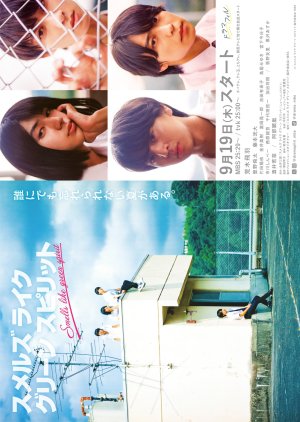
Cette critique peut contenir des spoilers
Not a typical BL, coming of age and discovering yourself
While many of us not understanding japanese have gripes with some of the subtitles, the second negative was the wig. It was a distraction in the whole series. It's not such projects are done overnight, so after casting they could have told him to grow his hair and use extensions.The third negative is the ending for one of the characters, keeping in the closet, being at least gay and denying himself to be truly happy but getting married for the "family".
The ending for Mishima could be closer to the manga where you see him living with Fujimoto together as a happy couple.
Other than that, the team removed some of the harshest scenes from the manga and tuned it down for normal viewers in contrast to "Happy of the End" which was raw. Other than that, the story was very close to the manga, the acting and cinematography was really good.
Mishima grows after enduring mental and sexual abuse, also with help of his understanding mother. The change of Fujimoto from bully to lover was also nicely done.
Overall a depcition of the harsh reality in a rural area in the 1990ties which is still common nowadways where especially boys who do not conform to expectations of society are still bullied without reason and due to bad parenting. There should be licence to be a parent imho, because it's a lot harder than driving a car.
When you find a service which offers good subtitles, you should watch it, but don't expect a BL, because it's a gay series which is a trend I wholeheartedly approve of.
Cet avis était-il utile?

Cette critique peut contenir des spoilers
Unrealistic reality
Mishima is in his last 2 years of highschool. Bullied by those who perceive him to be gay due to his long hair and soft appreance, he endures the scrutiny of all and sexual abuse at the hands of a closeted teacher. He internalizes everything and barely responds to his external environment. At night, he sneaks out his mother's lipstick and on occassion dresses as feminine as he can, while living in a small country village. In one scene he is mistaken for a girl as he's dressed in shorts, tshirt and walks a liitle gently. He doesn't pretend to be what he's not but he doesn't admit it as well.Awakening to himself, he befriends two previous bullies, Kirino and Yumeno. Kirino, an ally, also aware of his own nature, bonds with him. Together, they navigate the complexities of desires, dreams, the need to feel included and protected. Yumeno, crushing secretly on Mishima, has a fierce sense of wrong and right, and struggles to come to terms with his feelings for him. Mishima welcomes the attention from Yumeno.
Mishima was seen hugging both at different times for completely different reasons. After the physical attack, Yumeno comforts him publicly. Unashamed. Kirino, in turn, understanding his pain, comforts him after being rejected. This is how the rumors start and story veers to similar coming of age trope. Who will they become? This where my disappointment begins.
The subtitles are a little shaky from different sources, so I'll take it with a grain of salt but it has the same outcome no matter the true meaning - Kirino, conflicted on the getaway trip to Tokyo, says to Mishima, "I chose this." Previously, he expresses his desire for men, make up and being gay. He acknowledges the path ahead is difficult but assimilates into being straight for the love of his family. My disappointment stems from the path he chose - to be not himself but the path someone else sees for him. His parents will eventually die and he as it's shown, he will be in a marriage with a child but will he be happy. Even he had concerns of this. He avoids Mishima and their bond is broken. His loss. Yumeno, who sees all, follows Mishima, apologizes for past hurts and asks to keep thinking of Mishima.
The series ends with Mishima asserting himself. He is no longer shy and detached. He is a gay man, in men's clothing and still maintaining a strong relationship with Yumeno. Though the implication is more, as Yumeno kisses his cheek before leaving. As a makeup artist, Mishima's world has grown and he is proud of who he is on his terms.
Araki Towa, who played the role of Mishima, did a wonderful job. There is a vast difference between the teen and the adult. Which I applaud. Sakai Wakana, Mishima's mother, was also wonderful. Her unwavering support ensured that Mishima would succeed and Sakai did this beautifully. I am not a fan of easy choices or choosing to be what you are not. Yumeno's character makes it appear to be a choice. Even in the1990 setting, being gay or not being gay, shouldn't be a choice. I'm reminded of the series More Than Words here. The only choice that should matter is loving yourself, finding your happiness and pride in the human you are. Thank you, Mishima.
Cet avis était-il utile?

coming of age story set in the 90s
Overall: though parts of this were difficult to watch, it did hit on some realistic aspects of growing up in the 90s (and still today). 8 episodes about 25 minutes each. No official international platform. See my spoiler comment for the ending.Content Warnings: past death, bullying, held against will, homophobia, sexual harassment, manhandling/non-con touching, vomiting, peeping, grooming, child abuse/violence, sexual assault, kidnapping/held against will, punch
What I Liked
- the two supportive moms
- characters weren't what they first seemed
- one of the few redemption arcs that worked for me
- non cliched female classmate (wish they had a bit more closure for her though)
- I couldn't tell how the story would end which is different from most of what I watch
- production value
Room For Improvement
- the comedy didn't mesh well at times with the realism
- was not needed to have a second scene with a group peeping for a 2nd time on the couple in the truck, could have spent that time elsewhere
- the awful scene with the teacher in the car was too cartoony villain
Cet avis était-il utile?

A Review of SLGS set to the “Friends” Theme Song
I tried to write a straightforward review of this show many times. But it is so weird, and so full of tonal shifts and dissonance, that I couldn’t quite find a satisfying way to do it. So, I decided instead to write a review in the style of a 90s sitcom theme song, specifically Friends, given the setting of the show and its references to music. One of the virtues of the show is that, though it deals with very serious themes, and is often very moving, it refuses to take itself seriously. I have done the same thing, and hope I have somewhat succeeded in capturing the spirit of the show. If you know the theme tune, feel free to sing along.***
So no one told you life was gonna be this way
Your school’s a joke, you’re broke, your love life’s MIA
It’s like you’re always stuck in second year
When whether you’re a man, a woman, queer
or straight, is not even clear
but
I’ll be there for you
(When you beautify your lips)
I’ll be there for you
(When you embellish those lids)
I’ll be there for you
(‘Cause you’re queer as me too)
You think you’re being bullied, but he’s just another gay
You want your wig on, he shears it off, and it’s better everyway
You know you’d rather shag that gym teacher
But the only one who comes for you
is that creepy foul monster
but
I’ll be there for you
(When your life’s under threat)
I’ll be there for you
(When you’re full of dread and regret)
I’ll be there for you
(‘Cause you’re gay for me too)
[No one could ever know me
No one could ever see me
Seems you're the only one who knows
What it's like to be me
Someone to face the day with
Make it through all the rest with
Someone I'll always laugh with
Even at my worst, I'm best with you, yeah]
It’s true, we can’t always have our dream
But if from one of us these tears must stream
Let it be mine, for we’re a team
and
I’ll be there for you
(When the rain starts to pour)
I'll be there for you
(Like I've been there before)
I'll be there for you
('Cause you're there for me too)
***
This review is dedicated to ScorchQueen, whose encouragement and support on this site means much to me.
Reader's (Nirvana) Digest:
DO SAY: Come As You Are
DON’T SAY: Negative Creep
Cet avis était-il utile?

The hurdles of living in the 90s as someone who is tagged as “not normal”
It is a drama with a heavy message to the audience –such a beautiful yet painful portrayal of the realistic life of a homosexual individual way back in the 90s. Same-sex romance in the present year (2024) might be widely accepted in the world, but the reality is, that we still have a long way ahead before these homophobic groups stop stepping into one’s life and the right to freely live their life for who they are as a person. This is how the series presented its story by showcasing Mishima’s journey in life.The pain I felt from the first half was redirected until the last episode but for a different reason. No one deserves to be severely bullied especially at a young age. The actions were too violent and extreme. Despite all of these, Mishima continues to attend school with a positive approach. He surely is a kind-hearted boy who knows his self-worth. It is my first Araki Towa’s show and I liked his performance from this role.
I’ve seen a lot of Sono Shunta’s projects but this one is his most tragic role. Kirino’s ending was so sad that I can’t even blame him for choosing to live his life through marriage and having a kid. Witnessing his previous teacher’s life to experiencing it firsthand was a punch in the heart. The sound of judgment and disappointment from the people around him was so loud that he chose to live his life away from what he wanted it to be. The shot of his eyes at the end speaks a lot.
Abe Alan was the main influence on adding this to my list. His role in the mini-series, “I Became the Main Role of a BL Drama” is too lovely which is so distant from his performance as a creepy sensei in this series. No matter what character he portrayed, he already captured my heart as he is such a talented artist with a super handsome face.
The classic enemy-to-lovers trope is a twist on how unexpected it is for Yumeno to fall in love with Mishima. At least they had a cute ending, sticking together as an adult until the end. Being accepted by the family meant a lot for a homosexual person to be themselves without hiding in fear.
The lack of available streaming platforms internationally was disappointing. This series is a gem that needs a larger audience to consume the important life lessons that it has. The title itself is a metaphor that was too hard to define but as I was deeply intrigued by the story, I realized that it was the emotions dwelling inside the characters' lives.
Cet avis était-il utile?

We are in the 90s of the last century. We are in a quiet rural town during the Heisei era. We are facing a story of acceptance and self-discovery during adolescence, but far from the romanticism of most of the series based on manga that I usually review here, telling us a hard, stark and bittersweet story. This is a coming-of-age drama that explores the pressures to conform and the power of friendship.
The beginning of 'Smells Like Green Spirit', the LGBT+ themed drama series, is engaging. We are introduced to a high school student being chased by several of his schoolmates.
Mishima, an androgynous teenager who defies social norms of sexuality, with his very long hair, delicate beauty and marked feminine features, lives in two different worlds: while the Sun shines in the sky, his classmates give free rein to their homophobia and is systematically tortured for "appearing to be gay." At night, in the silence of his house, once his mother goes to bed, we can distinguish a boy who is clear that he likes boys, something he hides and, faced with the economic impossibility of buying other cosmetic products, he only applies lipstick taken from his mother's bag, while he enjoys dressing the clothes of the woman who sleeps a few meters away from him.
His colleagues harass and physically and psychologically attack him because of his femininity, calling him in the most derogatory ways alluding to his sexuality. But he doesn't care, he's happy being the way he is.
All this reveals two of the pillars of the work. But be careful, this is not a more or less classic story that revolves around transsexuality.
But that bittersweet existence takes a radical turn when he discovers by accident that the hatred that Makoto Kirino, one of his staunchest harassers, professes towards him, is not only the result of the education received by a heteronormative family or from living in a society that does not accept diversity and that makes someone who is different hate themselves for not fitting into a supposed canon of "normality", but that they have much more in common than what appears at first glance and that this hatred is actually a desire to have the freedom to be like him.
In this way, the fatherless young boy will discover that, like him, Kirino is gay and likes to cross-dress, but he has hidden this side of him due to his conservative mother, who cannot accept he son's true nature. In this sense, since his childhood, in his environment, Kirino has been raised listening to prejudices and stereotypes of rejection or hatred towards LGTB+ people. Having integrated these values into your system, the construction of your identity has been marked by those beliefs. For this reason, he considers that a part of him is not worthy of acceptance and recognition, so he must hide, compensate, repair... his sexuality.
This is how the series borders on that controversial stereotype that behind every homophobe there is someone repressing their authentic sexuality. However, Kirino's story is so well done that it is difficult not to empathize and feel sorry for him, and even understand the pain that not accepting oneself can lead to something terrible. Kirino is ultimately, unlike Mishima, a poor confused teenager with his head in a mess.
Although it is true that this stereotype also comes into play with another character with whom one does enter into more delicate terrain that is much more controversial, and I will not go into detail about it so as not to give away spoilers.
Once the moment of initial terror of being discovered has passed, Kirino experiences the relief of being able to show himself as he is to another person who does not judge him and understands him. Being able to talk and share their problems without having to hide will be the first step for the two to begin to weave a beautiful friendship based on the secrets they hide from the world. And in this way we discover the other pillar on which the series is based.
These two teenagers must face a hostile social environment, allies who are wolves in sheep's clothing, and, what's worse, the possibility of frustrating their families' expectations. They must not only hide from others, but also hide from themselves.
All this, while we are presented with a Japan far from the typical view and the images of cities of futuristic technology mixed with ancient traditions. A much "dirtier and darker" Japan, for a story that usually appears darker than what we get from there, where the main character suffers daily harassment by teenagers like him, while others are forced to hide who they are out of fear to receive the same bullying that Mishima suffers.
While Mishima benefits from having a loving and understanding mother, Kirino struggles to reconcile her sexuality with her oppressive and patriarchal upbringing.
Kirino quickly opens up to Mishima, when they both meet during free hours on the school roof and outside the educational grounds, and can be who he really is without having to hide, although in front of his classmates he has to continue pretending contrary. However, he slowly begins to change the way he treats Mishima in front of others as he begins to accept himself.
It is surprising that Mishima does not feel or express any type of resentment towards his harassers and that he quickly finds in Kirino a being similar to the one who forgives all the bad times he put him through.
Thanks to the friendship with Mishima, Kirino's character transforms into a totally different person. If it is true that his attitude at the beginning is inexcusable and unjustifiable, as you begin to interact more with Mishima you discover his past and who he really is, making it easier to connect with him.
Through Mishima we observe the story and see how Tarō Yumeno, another of his bullies, a classmate and one of the main players in the school basketball club, is actually a boy who hides behind the façade of the bully, and who always makes fun of Mishima, to hide his true feelings.
Falling in love with Mishima is easy; He is so tender, so close, that you can't help but love him, sympathize with his character, let yourself be carried away by his antics, identify with a being that is certain of knowing who he is, even if he has to hide it.
And as these three young people begin to discover who they are, struggling to define themselves, they will make difficult decisions that will shape the rest of their lives.
'Smells Like Green Spirit' presents a heartbreaking character study anchored by a confident and convincing performance by Araki Towa, Sono Shunta and Fujimoto Kodai, actors who play Mishima Futoshi, Kirino Makoto and Yumeno Taro, respectively.
Araki Towa shines in her role, which she plays with delicacy and melancholy.
It is interesting how the story mixes comic situations that will brighten your day with other moments of extreme drama that will break your heart, while telling a story whose characters explore different ways of living sexuality and gender identity. Without a doubt, they are characters that anyone can empathize with.
Screenwriter Arai Yuuka takes the cake by adapting the manga of the same name written and illustrated by Saburō Nagai, serialized in Fusion Product's Comic Be between 2011 and 2013, collected in two tankōbon volumes, which allows the viewer to take a look at how complicated it is. a time that is complex in itself like adolescence, when one also does not fit into what is considered normal. As in the original work, the narrative text not only allows a very honest story to be translated into moving images, but also skips many stereotypes associated with BL manga.
The series addresses topics such as transvestism, while emphasizing that being a transvestite does not mean being transsexual, and that, in turn, this is not linked to sexual orientation.
Linking family history makes it feel even more intimate and personal, especially when one of them's mother is a widow and the other is single, and they have raised their children with so much love that their descendants want to care for them in the same way.
Sawada Ikuko addresses all these complex issues with commendable delicacy and lucidity. He raises the questions but does not decide, does not judge, does not take sides.
It is also true that with a cast like this it makes it very easy for the viewer. In addition to the aforementioned actors, Abe Aran joins as Professor Yanagida, Sakai Miyuki as Futoshi's mother, Kanai Miki as Sawada Ayako, Kaji Masaki as Edokawa Toshihiko, Katada Hiyori as Fujii Rinka, among others. That is to say, the stellar performances of the entire cast, especially the young people who turn from rivals to friends, anchor the story.
With an outstanding soundtrack, whose musical themes are inserted in such a way that they become the perfect complement to the story, the Japanese director succeeds in maintaining her closeness with his main character at all times, especially in that climactic moment when Mishima and Kirino They look into each other's eyes for the first time and scrutinize their souls.
There are some clichés often found in LGBT+ stories, but for the most part, Sawada Ikuko creates a totally original drama that is worth watching. Bearing the weight of emotional trauma and gay shame, the three boys need more than a hug to get them through. But there is a hopeful message, tinged with painful sadness. 'Smells Like Green Spirit' teaches an important lesson that will reach many young people who struggle with their sexual preferences, especially those who live among family members who are intolerant towards LGBT+ people.
As a result, the series doesn't flinch from contemplating the unfortunate reality of hate and intolerance, but also reflects and celebrates the other side of humanity.
This is a bittersweet series that reinforces the idea that there are good people who will love and accept you no matter who you are. The audiovisual demonstrates great empathy for those who have to hide who they are throughout their lives, or part of it, even if that eventually turns them into melancholic beings.
It is a deeply personal story, which speaks of young queer people who have the luxury of searching for their identity and discovering who they are from an early age, and those who must keep part of their identity hidden for fear of losing their family or receiving hate from the community.
There are moments in this queer story that are truly terrifying and other moments are tender and pure.
For all that has been said, the series stays with the viewer after the final credits of the first three episodes of the 9 that the MBS and TVK audiovisual have.
A splendid and bittersweet story as well as a tough love story. Yes, of love, because self-acceptance can only be fulfilled with a lot of love.
Cet avis était-il utile?

Cette critique peut contenir des spoilers
Smells like a masterpiece
The first few episodes are a bit confusing and you don't quite understand what story is being told, but when the series finally finds its rhythm and begins to build Mishima and Makoto's story of friendship, acceptance and discovery, it's simply impeccable.It's refreshing to see a series set in the 90s that talks so openly and beautifully about its characters' sexuality.
It's a light-hearted series, with excellent acting, competent production and a script full of rich and profound scenes and dialogues.
It's funny and exaggerated, but it's also subtle and conveys this feeling of discovery in adolescence. The scene of each of these characters talking to their mothers and accepting (or repressing) their sexuality is full of beauty and impact.
The construction of Makoto, her transsexuality and the dreams she abandoned to please her mother is so painful and constructed in such an exquisite way.
I really wish the series had two more episodes to explore these characters' adult lives. An impeccable series with a story that is so human, so real and so painfully beautiful.
Cet avis était-il utile?

Cette critique peut contenir des spoilers
The Most Realistic Depiction of Queer Community
Adapted from the manga series “Smells Like Green Spirit” (スメルズライクグリーンスピリット) by Nagai Saburo (永井三郎), the show is set in the 1990s era where homophobia wasn’t any less prevalent than it is now. In the midst of a school setting, we have “Coming Of Age” storyline which retraces how transgenders were hugely perceived. The ridicule coupled with rampant bullying made their existence rather difficult. There were many who succumbed to this pressure while few daring ones choose to live their life fearlessly. This story belongs to one such brave persona, Mishima Futoshi. The subtleties of this character are portrayed so boldly by Araki Towa, that you want to celebrate their independence and freedom. MBS is engaging in stories that are intrinsically interwoven with the dynamics of the queer community. They are thought-provoking, mindful and also captivating. One man’s struggle against societal prejudices becomes the crux of this storyline. From the way you dress to the way you behave, society judges you on everything; but who are they to judge others & are their opinions that important?Read the complete article here-
https://the-bl-xpress.com/2024/11/16/smells-like-green-spirit-series-review-ep-1-to-8/
Cet avis était-il utile?
Cette critique peut contenir des spoilers
Interesting story, great cast
I think the first point I need to highlight is how great the cast is! Young actors that are actually close to the age of the characters and delivering fantastic performances.I wouldn’t say this is a BL or a series about exploring sexuality, this is a story about gender. Mishima started the series knowing he is gay and knowing that, although he likes to play with his hair and makeup, he doesn’t wanna be a girl. We also know he’s attracted to the coach and starts his relationship with Yumeno.
While with Kirino, we don’t really see him liking anyone or wanting anything with other boys. Kirino wants to live as a girl. I fully believe when he says that he thought he liked the coach because he actually wanted the coach to be his dad.
With all that, the story, in my opinion, is the journey of Mishima helping Kirino to live his dream, even if just for a semester.
I understand the ending is not necessarily happy, but it’s just one minute of Kirino’s adult life. I understand why he needed to be distant from Mishima. He can be both happy with his family and still wanting to explore the Pandora’s Box inside.
PS: Happy that we see Mishima and Yumeno still together in the end.
Cet avis était-il utile?

Cette critique peut contenir des spoilers
Lots of Potential, but Fell Flat because of it's Too Gloomy
•❅✧❅✦ Story ✦❅✧❅•Smells Like Green Spirit had the potential to be a really thought-provoking drama with all of the themes it decided to tackle, but it really fell flat with its gloomy atmosphere and rushed ending.
The drama tackles the theme of sexuality in the 90s. They also sprinkled in some of the usual troupes of bullying, societal pressure through neighborhood gossip, and coming out. There was also a little bit of sexual assault thrown in the mix as well. Just by reading all of the themes, you can tell they are not happy themes at all. It’s all doom and gloom, and with only 8 episodes it’s hard to insert many happy moments. It seems like Mishima is constantly facing some sort of gloomy trouble that he can never catch a break to be happy. And this is what is missing from the drama.
Every episode seems to be gloomy with no happiness that we end up feeling bad for Mishima. Even the ending, which is supposed to show Mishima being happy, no longer struggling with his sexuality, is rushed and crammed into the last few minutes. Even his cross-dressing nature is lost that when Mishima is shown as a drag queen model, we don’t even know if it is actually him or not. It’s sad, since this could have been a good coming of age drama!
•❅✧❅✦ Themes ✦❅✧❅•
Smells Like Green Spirit tackles many themes including sexuality in the 90s, bullying, societal pressure, neighborhood gossip, coming out, and sexual assault. The most prevalent is the reality of sexuality in the 90s and societal pressure through neighborhood gossip.
The drama focuses on each theme they try to tackle though gossip from the neighborhood. We then learn about the truth of the situation through the characters they are gossiping about. It’s really sad because on more than one occasion, the characters change their course of action after hearing the neighborhood gossip. Kirino can’t even live his life freely because his mother bends to the pressure of society and he doesn’t want to disappoint her. He even went as far as trying to run away, only to be pulled back because the neighborhood gossip hit his mother and she collapsed.
I could go on and on about each theme, but the neighborhood gossip really pissed me off while watching because it was so accurate to how the Japanese bend to the pressure of their social image, even in this day and age!
•❅✧❅✦ Overall ✦❅✧❅•
Smells Like Green Spirit could have been a thought-provoking drama, but it kind of fell flat for me with it’s doom and gloom. Other people really seem to give it high regards, so I guess it’s good. Maybe I just have really high standards. Or I just found it too gloomy to see the positives of this drama.
Either way, I think the drama was nice, but it’s not something I would ever watch again. I honestly don’t even feel like reading the manga since it’s more gloomy than happy. Overall, it’s a decent coming of age story, but it’s really not for me.
Cet avis était-il utile?

Cette critique peut contenir des spoilers
Coming of age and acceptance: an introspection
Quite a unique story coming told from the lens of a boy in the 90s, rural Japan and how he is being bullied for his feminine appearance. I had a hard time watching this at first bcs i just can't deal with bullying in general, esp this much. But the story progresses quickly and mishima who is self-accepting gets to know learn about kirino's own secret realted to their sexuality, and thus a friendship blooms.I just yearned for this friendship that developed btwn them bcs it has been hard for both of them, and to find a person who can relate, it is just a magical feeling. yet the story continues to showcases the struggles when they are outside their bubble. And then there is Yumeno who falls in love with Mishima but can't quite accept his romantic feelings for a guy. These three vastly different perspective make for such a well-rounded story, a story that explores not only the good and the bad.
The coming out scene for the three of them is propbaly my favourite moment i've seen all year, bcs we really get to see how every parent reacts to this revelation. Mishima's mothe ris accepting, even going as far as to tell hem to leave this down whenever he can, bcs the world has more to offer for him. Loved her, truly a star. Kirino's mom is the complete opposite. She is fully in denial, blaming herself and having a panick attack. Kirino keeps to himself and ultimately he didn't choose to live for himself, but for his family, for his status, and it's unfortunate, but sadly a avery true reality. Yumeno, by the tim his mom finds out, he's still very much struggling, and she is too but it feels like they are this path tgt.
I just feel blessed to have seen this piece bcs it amplified my feelings with regard to compassion, hurt and understanding. Bitter sweet ending, but would do it all over again
Cet avis était-il utile?
I love these kind of stories that explore human connection and growth.
I really appreciate the way they approached this show. Rather than "tackling" the subject matter, it more delicately inquires into the minds of these teenagers who are still trying to figure themselves out. And of course, this all happens in a rural town that doesn't really know how to handle their complexities. I'd say genre wise there are themes of [coming of age/absurdism/slice of life/angst]. We still have 3 more episodes left so we'll have to see how the story continues, but so far I really appreciate what they're exploring with this piece.Cet avis était-il utile?

 1
1
































